formerly eScholarship Editions


|
|
|
|
Your search for
'History and Philosophy of Science' in subject
and
Public
in rights
found 29 book(s). | Modify Search | Displaying 1 - 20 of 29 book(s) | |
| 1. | 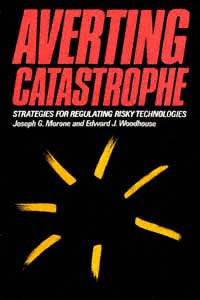 | Title: Averting catastrophe: strategies for regulating risky technologies Author: Morone, Joseph G Published: University of California Press, 1988 Subjects: Environmental Studies | History and Philosophy of Science | Politics Publisher's Description: Chernobyl, Bhopal, and Love Canal are symbols of the potentially catastrophic risks that go hand in hand with much modern technology. This volume is a non-partisan study of the imperfect but steadily developing system for containing the risks of such technologies as chemicals, nuclear power, and gen . . . [more] Similar Items |
| 2. | 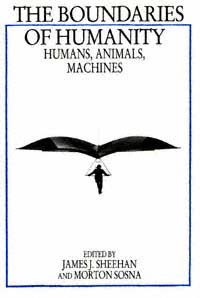 | Title: The Boundaries of humanity: humans, animals, machines Author: Sheehan, James J Published: University of California Press, 1991 Subjects: Philosophy | History and Philosophy of Science | Biology | Technology and Society Publisher's Description: To the age-old debate over what it means to be human, the relatively new fields of sociobiology and artificial intelligence bring new, if not necessarily compatible, insights. What have these two fields in common? Have they affected the way we define humanity? These and other timely questions are addressed with colorful individuality by the authors of The Boundaries of Humanity .Leading researchers in both sociobiology and artificial intelligence combine their reflections with those of philosophers, historians, and social scientists, while the editors explore the historical and contemporary contexts of the debate in their introductions. The implications of their individual arguments, and the often heated controversies generated by biological determinism or by mechanical models of mind, go to the heart of contemporary scientific, philosophical, and humanistic studies. [brief] Similar Items |
| 3. | 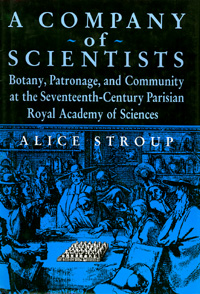 | Title: A company of scientists: botany, patronage, and community at the Seventeenth-century Parisian Royal Academy of Sciences Author: Stroup, Alice Published: University of California Press, 1990 Subjects: History | History and Philosophy of Science | European History Publisher's Description: Who pays for science, and who profits? Historians of science and of France will discover that those were burning questions no less in the seventeenth century than they are today. Alice Stroup takes a new look at one of the earliest and most influential scientific societies, the Académie Royale des Sciences. Blending externalist and internalist approaches, Stroup portrays the Academy in its political and intellectual contexts and also takes us behind the scenes, into the laboratory and into the meetings of a lively, contentious group of investigators.Founded in 1666 under Louis XIV, the Academy had a dual mission: to advance science and to glorify its patron. Creature of the ancien régime as well as of the scientific revolution, it depended for its professional prestige on the goodwill of monarch and ministers. One of the Academy's most ambitious projects was its illustrated encyclopedia of plants. While this work proceeded along old-fashioned descriptive lines, academicians were simultaneously adopting analogical reasoning to investigate the new anatomy and physiology of plants. Efforts to fund and forward competing lines of research were as strenuous then as now. We learn how academicians won or lost favor, and what happened when their research went wrong. Patrons and members shared in a new and different kind of enterprise that may not have resembled the Big Science of today but was nevertheless a genuine "company of scientists." [brief] Similar Items |
| 4. | 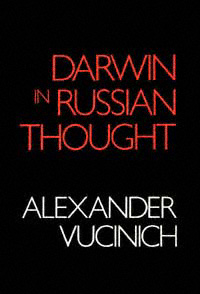 | Title: Darwin in Russian thought Author: Vucinich, Alexander 1914- Published: University of California Press, 1989 Subjects: Science | History and Philosophy of Science Publisher's Description: Darwin in Russian Thought represents the first comprehensive and systematic study of Charles Darwin's influence on Russian thought from the early 1860s to the October Revolution. While concentrating on the role of Darwin's theory in the development of Russian science and philosophy, Vucinich also explores the dominant ideological and sociological interpretations of evolutionary thought, providing a deft analysis of the views held by the leaders of Russian nihilism, populism, anarchism, and marxism.Darwin's thinking profoundly influenced intellectual discourse in Russia: it effected the emergence of "theoretical theology," a modern effort to provide theological responses to the revolutionary changes in the natural sciences, contributed to the evolution of a modern scientific community, and spurred the rapidly growing concern with the epistemological and ethical foundations of science in general. Scholarly battles were waged among the critics of Darwin - Karl von Baer, Nikolai Iakovlevich Danilevskii and Sergei Ivanovich Korzhinskii, and others - and the defenders of the faith.Vucinich is able to delineate the distinctive national characteristics of Russian Darwinism: the strong influence of Lamarckian thought, the delayed recognition of the contributions of genetics, the near-universal rejection of Social Darwinism, the early anticipation of the triumph of "evolutionary synthesis," and the heavy concentration on the social and moral aspects of evolutionary thought. Vividly argued and rich in detail, Darwin in Russian Thought provides a unique glimpse into the Russian psyche. [brief] Similar Items |
| 5. |  | Title: Descartes's imagination: proportion, images, and the activity of thinking Author: Sepper, Dennis L Published: University of California Press, 1996 Subjects: Philosophy | History and Philosophy of Science Publisher's Description: Renè Descartes is commonly portrayed as a strict rationalist, a philosopher who theorized a radical, unresolvable split between mind and body. In this long-overdue examination of the role of imagination in Descartes's thought, Dennis Sepper reveals a Descartes quite different from the usual dualistic portrayals and offers a critical reconception of the genesis and nature of the philosopher's thought.In a vigorous analysis of the less-known early works, Sepper finds that initially Descartes assigned the imagination a central role in the mind's activity. Although Descartes eventually lost confidence in the philosophy of imagination, an early understanding of its central role in cognition came to shape the most fundamental notions of his mature philosophy. Sepper's radical reassessment of Descartes ultimately raises new questions about the development of modern philosophy. [brief] Similar Items |
| 6. | 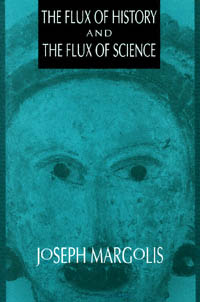 | Title: The flux of history and the flux of science Author: Margolis, Joseph 1924- Published: University of California Press, 1993 Subjects: Philosophy | History and Philosophy of Science Publisher's Description: Does thinking have a history? If there are no necessarily changeless structures to be found in things and in our inquiry into them, then what knowledge of the world and ourselves is possible? In this boldly original and elegantly written study, Joseph Margolis argues for a radically historicized view of history that treats it as both a real process and a narrative account, each a product of continual change. Developing his argument through discussions of such influential philosophers of history and the natural sciences as Vico, Danto, Collingwood, Habermas, Hempel, Popper, Putnam, and Gadamer, he provides a coherent theory of flux and invariance that resolves several deep puzzles regarding human nature and understanding.While maintaining a thorough command of Anglo-American philosophy, Margolis challenges many of its most cherished assumptions and demonstrates the sense in which history and interpretation are one and the same. Exploring one of the master themes of this century, his book offers a novel theory of the human condition whose conclusions and concerns seem certain to inform philosophy in the next century as well. [brief] Similar Items |
| 7. | 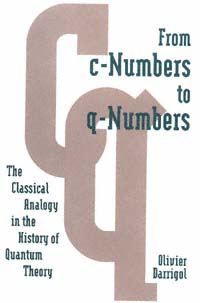 | Title: From c-numbers to q-numbers: the classical analogy in the history of quantum theory Author: Darrigol, Olivier Published: University of California Press, 1993 Subjects: History | History and Philosophy of Science | Physics Publisher's Description: The history of quantum theory is a maze of conceptual problems, through which Olivier Darrigol provides a lucid and learned guide, tracking the role of formal analogies between classical and quantum theory. From Planck's first introduction of the quantum of action to Dirac's formulation of quantum mechanics, Darrigol illuminates not only the history of quantum theory but also the role of analogies in scientific thinking and theory change.Unlike previous works, which have tended to focus on qualitative, global arguments, Darrigol's study follows the lines of mathematical reasoning and symbolizing and so is able to show the motivations of early quantum theorists more precisely - and provocatively - than ever before. Erudite and original, From c-Numbers to q-Numbers sets a new standard as a philosophically perceptive and mathematically precise history of quantum mechanics. For years to come it will influence historical and philosophical discussions of twentieth-century physics. [brief] Similar Items |
| 8. | 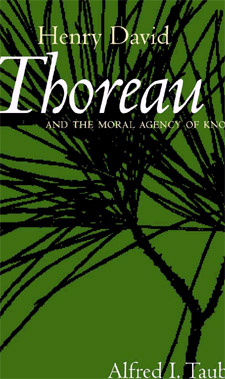 | Title: Henry David Thoreau and the moral agency of knowing Author: Tauber, Alfred I Published: University of California Press, 2001 Subjects: Philosophy | Literature | History and Philosophy of Science | Ethics Publisher's Description: In his graceful philosophical account, Alfred I. Tauber shows why Thoreau still seems so relevant today - more relevant in many respects than he seemed to his contemporaries. Although Thoreau has been skillfully and thoroughly examined as a writer, naturalist, mystic, historian, social thinker, Transcendentalist, and lifelong student, we may find in Tauber's portrait of Thoreau the moralist a characterization that binds all these aspects of his career together. Thoreau was caught at a critical turn in the history of science, between the ebb of Romanticism and the rising tide of positivism. He responded to the challenges posed by the new ideal of objectivity not by rejecting the scientific worldview, but by humanizing it for himself. Tauber portrays Thoreau as a man whose moral vision guided his life's work. Each of Thoreau's projects reflected a self-proclaimed "metaphysical ethics," an articulated program of self-discovery and self-knowing. By writing, by combining precision with poetry in his naturalist pursuits and simplicity with mystical fervor in his daily activity, Thoreau sought to live a life of virtue - one he would characterize as marked by deliberate choice. This unique vision of human agency and responsibility will still seem fresh and contemporary to readers at the start of the twenty-first century. [brief] Similar Items |
| 9. | 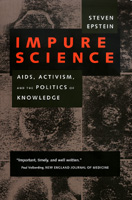 | Title: Impure science: AIDS, activism, and the politics of knowledge Author: Epstein, Steven Published: University of California Press, 1996 Subjects: Social Science | Medicine | Public Policy | History and Philosophy of Science | Sociology Publisher's Description: In the short, turbulent history of AIDS research and treatment, the boundaries between scientist insiders and lay outsiders have been crisscrossed to a degree never before seen in medical history. Steven Epstein's astute and readable investigation focuses on the critical question of "how certainty is constructed or deconstructed," leading us through the views of medical researchers, activists, policy makers, and others to discover how knowledge about AIDS emerges out of what he calls "credibility struggles."Epstein shows the extent to which AIDS research has been a social and political phenomenon and how the AIDS movement has transformed biomedical research practices through its capacity to garner credibility by novel strategies. Epstein finds that nonscientist AIDS activists have gained enough of a voice in the scientific world to shape NIH?sponsored research to a remarkable extent. Because of the blurring of roles and responsibilities, the production of biomedical knowledge about AIDS does not, he says, follow the pathways common to science; indeed, AIDS research can only be understood as a field that is unusually broad, public, and contested. He concludes by analyzing recent moves to democratize biomedicine, arguing that although AIDS activists have set the stage for new challenges to scientific authority, all social movements that seek to democratize expertise face unusual difficulties.Avoiding polemics and accusations, Epstein provides a benchmark account of the AIDS epidemic to date, one that will be as useful to activists, policy makers, and general readers as to sociologists, physicians, and scientists. [brief] Similar Items |
| 10. | 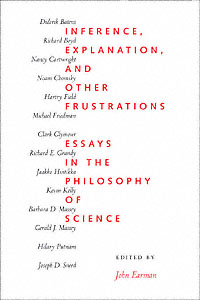 | Title: Inference, explanation, and other frustrations: essays in the philosophy of science Author: Earman, John Published: University of California Press, 1992 Subjects: Philosophy | History and Philosophy of Science Publisher's Description: These provocative essays by leading philosophers of science exemplify and illuminate the contemporary uncertainty and excitement in this changing field. The papers are rich in new perspectives, and their far-reaching criticisms challenge arguments long prevalent in classic philosophical problems of induction, empiricism, and realism. By turns empirical or analytic, historical or programmatic, confessional or argumentative, the authors' arguments both describe and demonstrate the fact that philosophy of science is in a ferment more intense than at any time since the heyday of logical positivism seventy years ago. [brief] Similar Items |
| 11. | 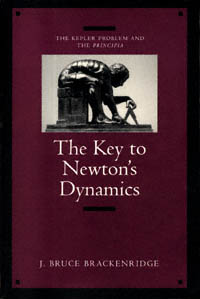 | Title: The key to Newton's dynamics: the Kepler problem and the Principia: containing an English translation of sections 1, 2, and 3 of book one from the first (1687) edition of Newton's Mathematical principles of natural philosophy Author: Brackenridge, J. Bruce 1927- Published: University of California Press, 1996 Subjects: Science | Physics | History and Philosophy of Science Publisher's Description: While much has been written on the ramifications of Newton's dynamics, until now the details of Newton's solution were available only to the physics expert. The Key to Newton's Dynamics clearly explains the surprisingly simple analytical structure that underlies the determination of the force necessary to maintain ideal planetary motion. J. Bruce Brackenridge sets the problem in historical and conceptual perspective, showing the physicist's debt to the works of both Descartes and Galileo. He tracks Newton's work on the Kepler problem from its early stages at Cambridge before 1669, through the revival of his interest ten years later, to its fruition in the first three sections of the first edition of the Principia . [brief] Similar Items |
| 12. |  | Title: The king's midwife: a history and mystery of Madame du Coudray Author: Gelbart, Nina Rattner Published: University of California Press, 1998 Subjects: History | European History | Women's Studies | Autobiographies and Biographies | French Studies | History and Philosophy of Science | Medicine Publisher's Description: This unorthodox biography explores the life of an extraordinary Enlightenment woman who, by sheer force of character, parlayed a skill in midwifery into a national institution. In 1759, in an effort to end infant mortality, Louis XV commissioned Madame Angélique Marguerite Le Boursier du Coudray to travel throughout France teaching the art of childbirth to illiterate peasant women. For the next thirty years, this royal emissary taught in nearly forty cities and reached an estimated ten thousand students. She wrote a textbook and invented a life-sized obstetrical mannequin for her demonstrations. She contributed significantly to France's demographic upswing after 1760.Who was the woman, both the private self and the pseudonymous public celebrity? Nina Rattner Gelbart reconstructs Madame du Coudray's astonishing mission through extensive research in the hundreds of letters by, to, and about her in provincial archives throughout France. Tracing her subject's footsteps around the country, Gelbart chronicles du Coudray's battles with finance ministers, village matrons, local administrators, and recalcitrant physicians, her rises in power and falls from grace, and her death at the height of the Reign of Terror. At a deeper level, Gelbart recaptures du Coudray's interior journey as well, by questioning and dismantling the neat paper trail that the great midwife so carefully left behind. Delightfully written, this tale of a fascinating life at the end of the French Old Regime sheds new light on the histories of medicine, gender, society, politics, and culture. [brief] Similar Items |
| 13. | 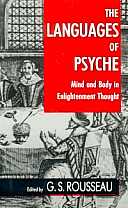 | Title: The Languages of psyche: mind and body in Enlightenment thought: Clark Library lectures, 1985-1986 Author: Rousseau, G. S. (George Sebastian) Published: University of California Press, 1991 Subjects: History | Medicine | History and Philosophy of Science | European History | European Literature Publisher's Description: The Languages of Psyche traces the dualism of mind and body during the "long eighteenth century," from the Restoration in England to the aftermath of the French Revolution. Ten outstanding scholars investigate the complex mind-body relationship in a variety of Enlightenment contexts - science, medicine, philosophy, literature, and everyday society. No other recent book provides such an in-depth, suggestive resource for philosophers, literary critics, intellectual and social historians, and all who are interested in Enlightenment studies. [brief] Similar Items |
| 14. | 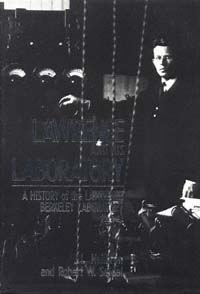 | Title: Lawrence and his laboratory: a history of the Lawrence Berkeley Laboratory Author: Heilbron, J. L Published: University of California Press, 1990 Subjects: Science | History and Philosophy of Science Publisher's Description: The Radiation Laboratory in Berkeley, California, was the birthplace of particle accelerators, radioisotopes, and modern big science. This first volume of its history is a saga of physics and finance in the Great Depression, when a new kind of science was born.Here we learn how Ernest Lawrence used local and national technological, economic, and manpower resources to build the cyclotron, which enabled scientists to produce high-voltage particles without high voltages. The cyclotron brought Lawrence forcibly and permanently to the attention of leaders of international physics in Brussels at the Solvay Congress of 1933. Ever since, the Rad Lab has played a prominent part on the world stage.The book tells of the birth of nuclear chemistry and nuclear medicine in the Laboratory, the discoveries of new isotopes and the transuranic elements, the construction of the ultimate cyclotron, Lawrence's Nobel Prize, and the energy, enthusiasm, and enterprise of Laboratory staff. Two more volumes are planned to carry the story through the Second World War, the establishment of the system of national laboratories, and the loss of Berkeley's dominance of high-energy physics. [brief] Similar Items |
| 15. | 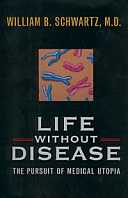 | Title: Life without disease: the pursuit of medical utopia Author: Schwartz, William B 1922- Published: University of California Press, 1998 Subjects: Science | Medicine | Economics and Business | History and Philosophy of Science | Public Policy Publisher's Description: The chaotic state of today's health care is the result of an explosion of effective medical technologies. Rising costs will continue to trouble U.S. health care in the coming decades, but new molecular strategies may eventually contain costs. As life expectancy is dramatically extended by molecular medicine, a growing population of the aged will bring new problems. In the next fifty years genetic intervention will shift the focus of medicine in the United States from repairing the ravages of disease to preventing the onset of disease. Understanding the role of genes in human health, says Dr. William B. Schwartz, is the driving force that will change the direction of medical care, and the age-old dream of life without disease may come close to realization by the middle of the next century. Medical care in 2050 will be vastly more effective, Schwartz maintains, and it may also be less expensive than the resource-intensive procedures such as coronary bypass surgery that medicine relies on today.Schwartz's alluring prospect of a medical utopia raises urgent questions, however. What are the scientific and public policy obstacles that must be overcome if such a goal is to become a reality? Restrictions on access imposed by managed care plans, the corporatization of charitable health care institutions, the increasing numbers of citizens without health insurance, the problems with malpractice insurance, and the threatened Medicare bankruptcy - all are the legacy of medicine's great progress in mastering the human body and society's inability to assimilate that mastery into existing economic, ethical, and legal structures. And if the average American life span is 130 years, a genuine possibility by 2050, what social and economic problems will result?Schwartz examines the forces that have brought us to the current health care state and shows how those same forces will exert themselves in the decades ahead. Focusing on the inextricable link between scientific progress and health policy, he encourages a careful examination of these two forces in order to determine the kind of medical utopia that awaits us. The decisions we make will affect not only our own care, but also the system of care we bequeath to our children. [brief] Similar Items |
| 16. | 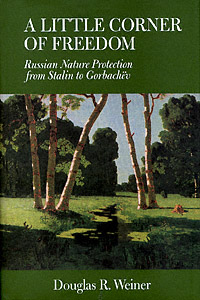 | Title: A little corner of freedom: Russian nature protection from Stalin to Gorbachëv Author: Weiner, Douglas R 1951- Published: University of California Press, 1999 Subjects: Russian and Eastern European Studies | Environmental Studies | Politics | History | History and Philosophy of Science | Ecology Publisher's Description: While researching Russia's historical efforts to protect nature, Douglas Weiner unearthed unexpected findings: a trail of documents that raised fundamental questions about the Soviet political system. These surprising documents attested to the unlikely survival of a critical-minded, scientist-led movement through the Stalin years and beyond. It appeared that, within scientific societies, alternative visions of land use, resrouce exploitation, habitat protection, and development were sustained and even publicly advocated. In sharp contrast to known Soviet practices, these scientific societies prided themselves on their traditions of free elections, foreign contacts, and a pre-revolutionary heritage.Weiner portrays nature protection activists not as do-or-die resisters to the system, nor as inoffensive do-gooders. Rather, they took advantage of an unpoliced realm of speech and activity and of the patronage by middle-level Soviet officials to struggle for a softer path to development. In the process, they defended independent social and professional identities in the face of a system that sought to impose official models of behavior, ethics, and identity for all. Written in a lively style, this absorbing story tells for the first time how organized participation in nature protection provided an arena for affirming and perpetuating self-generated social identities in the USSR and preserving a counterculture whose legacy survives today. [brief] Similar Items |
| 17. | 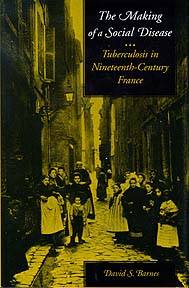 | Title: The making of a social disease;: tuberculosis in nineteenth-century France Author: Barnes, David S Published: University of California Press, 1995 Subjects: History | History and Philosophy of Science | Medicine | European History Publisher's Description: In this first English-language study of popular and scientific responses to tuberculosis in nineteenth-century France, David Barnes provides a much-needed historical perspective on a disease that is making an alarming comeback in the United States and Europe. Barnes argues that French perceptions of the disease - ranging from the early romantic image of a consumptive woman to the later view of a scourge spread by the poor - owed more to the power structures of nineteenth-century society than to medical science. By 1900, the war against tuberculosis had become a war against the dirty habits of the working class.Lucid and original, Barnes's study broadens our understanding of how and why societies assign moral meanings to deadly diseases. [brief] Similar Items |
| 18. | 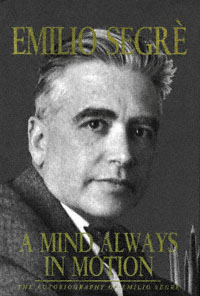 | Title: A mind always in motion: the autobiography of Emilio Segrè Author: Segrè, Emilio Published: University of California Press, 1993 Subjects: Science | History and Philosophy of Science | Physics | Autobiography Publisher's Description: The renowned physicist Emilio Segrè (1905-1989) left his memoirs to be published posthumously because, he said, "I tell the truth the way it was and not the way many of my colleagues wish it had been." This compelling autobiography offers a personal account of his fascinating life as well as candid portraits of some of this century's most important scientists, such as Enrico Fermi, E. O. Lawrence, and Robert Oppenheimer.Born in Italy to a well-to-do Jewish family, Segrè showed early signs of scientific genius - at age seven he began a notebook of physics experiments. He became Fermi's first graduate student in 1928 and contributed to the discovery of slow neutrons, and later was appointed director of the physics laboratory at the University of Palermo. While visiting the Radiation Laboratory at Berkeley in 1938, he learned that he had been dismissed from his Palermo post by Mussolini's Fascist regime. Lawrence then hired him to work on the cyclotron at Berkeley with Luis Alvarez, Edwin McMillan, and Glenn Seaborg. Segrè was one of the first to join Oppenheimer at Los Alamos, where he became a group leader on the Manhattan Project. His account of that mysterious enclave of scientists, all working feverishly to develop the atomic bomb before the Nazis did, includes his description of the first explosion at Alamogordo.Segrè writes movingly of the personal devastation wrought by the Nazis, his struggles with fellow scientists, and his love of nature. His book offers an intimate glimpse into a bygone era as well as a unique perspective on some of the most important scientific developments of this century. [brief] Similar Items |
| 19. | 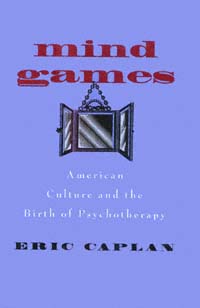 | Title: Mind games: American culture and the birth of psychotherapy Author: Caplan, Eric 1962- Published: University of California Press, 1998 Subjects: History | United States History | American Studies | Science | History and Philosophy of Science Publisher's Description: Eric Caplan's fascinating exploration of Victorian culture in the United States shatters the myth of Freud's seminal role in the creation of American psychotherapy. Resurrecting the long-buried "prehistory" of American mental therapeutics, Mind Games tells the remarkable story of how a widely assorted group of actors - none of them hailing from Vienna or from any other European city - compelled a reluctant medical profession to accept a new role for the mind in medicine. By the time Freud first set foot on American soil in 1909, as Caplan demonstrates, psychotherapy was already integrally woven into the fabric of American culture and medicine.What came to be known as psychotherapy emerged in the face of considerable opposition, much - indeed most - of which was generated by the medical profession itself. Caplan examines the contentious interplay within the American medical community, as well as between American physicians and their lay rivals, who included faith-healers, mind-curists, Christian Scientists, and Protestant ministers. These early practitioners of alternative medicine ultimately laid the groundwork for a distinctive and much heralded American type of psychotherapy. Its grudging acceptance by both medical elites and rank and file physicians signified their understanding that reliance on physical therapies to treat nervous and mental symptoms compromised their capacity to treat - and compete - effectively in a rapidly expanding mental-medical marketplace. Mind Games shows how psychotherapy came to occupy its central position in mainstream American culture. [brief] Similar Items |
| 20. |  | Title: Nerves and narratives: a cultural history of hysteria in nineteenth-century British prose Author: Logan, Peter Melville 1951- Published: University of California Press, 1997 Subjects: Literature | History | History and Philosophy of Science | Literary Theory and Criticism | Victorian History | English Literature | Women's Studies Publisher's Description: The British middle class of the early nineteenth century was defined by its nervous complaints - hysteria, hypochondria, vapours, melancholia, and other maladies. Peter Melville Logan explores the link between medical theories of nervous physiology and narrative issues central to the literary writing of the period. He examines the assumption, implicit in medical thinking at the time, that the nervous body - unlike its non-nervous counterpart - has a narrative inscribed on its nerve fibers. It becomes "the body with a story to tell."Logan takes up several literary works whose nervous narrators connect their present disorder with an unnatural, unhealthy social order. Concentrating on novels by Godwin, Hays, and Edgeworth, and on De Quincey's Confessions of an English Opium-Eater , Logan weaves cultural phenomena such as crowd psychology and attitudes toward opium addiction into the basic paradigm of the nervous narrative. He explains why these social critiques always tended to promote the same distempered civilization that brought them into being. He then looks at the emergence of the working-class body in the 1840s, changing medical theories, and George Eliot's treatment of medicine in Middlemarch .Logan's book is especially valuable for its rethinking of disciplinary categories that separate medicine from literature and for bringing to light lesser-known literary texts. With a foreword by Roy Porter, it will be a welcome addition to literary, gender, and cultural studies. [brief] Similar Items |